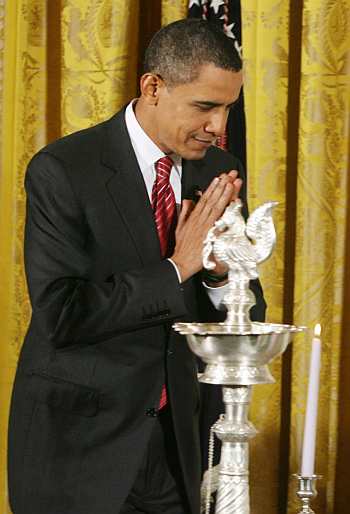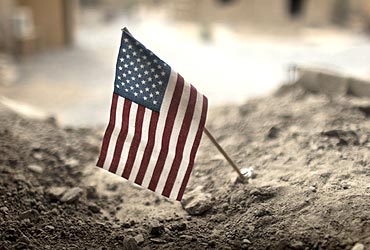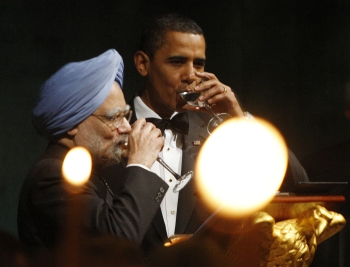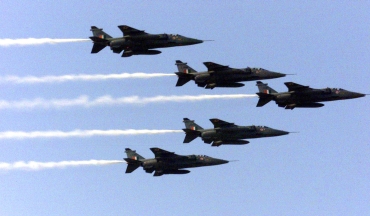 | « Back to article | Print this article |
India, US need to sort out these issues before Obama's visit
India and the United States are searching for the right language to help take major Indian entities out of a tough US list that bans all trade with these firms, in the run-up to US President Barack Obama's four-day November visit to India.
The irony is that even as both sides are keen on engaging each other -- and several ministers were here recently to embark upon a multi-faceted relationship from education to agriculture to cooperation in new frontiers such as space -- they also continue to talk past each other on key bilateral and regional issues.
Conversations with several officials in Washington DC, who requested anonymity, as well as South Asia analysts well acquainted with the corridors of power here, reveal that while the preparation for Obama's four-day India trip is in full swing, enthusiasm for a Pakistan visit is so low that the likelihood of it not taking place at all is actually quite high.
Reportage: Jyoti Malhotra
India, US need to sort out these issues
A stand-alone India visit by Obama would be a shot in the arm for the India-US relationship, signalling the US president's intent to not only permanently de-hyphenate the two South Asian countries but also recognise India's pre-eminent place in the region.
Topping the Indo-US agenda on sticky issues needing resolution is the issue of removing top Indian entities, such as the Defence Research and Development Organisation, Indian Space Research Organisation and Bharat Electronics, from a tough US export control list so that both countries can begin to trade normally in high-technology and dual-use goods.
A second key difference of perception pertains to the Afghanistan-Pakistan situation, on which intensive discussions have taken place all of last week, with the visit of India's special envoy to Afghanistan S K Lambah. While US officials privately admit the 'deep complicity' of the Pakistan army and its intelligence agency, the Inter Services Intelligence, on maintaining links with top figures of the Al Qaeda-Taliban even as they jointly fight the war against terror with US/NATO forces, they are unwilling to publicly admit that India remains on the frontline of the terrorism unleashed from the Af-Pak badlands.
India, US need to sort out these issues
But it is the more immediate spat on ending US sanctions against the Indian entities that is concentrating minds these days. Trade with these entities was banned after India went nuclear in 1998 and has remained, despite the passage of the Indo-US nuclear deal in 2008, because of India's refusal to sign what it terms the discriminatory Nuclear Non-Proliferation Treaty.
So, when US officials argued recently that India must reiterate its determination to strictly abide by its own export control laws that prevent any leakages of technology it may buy from the US in the future, they didn't expect the backlash they received from Delhi. The US officials, anticipating the opening of the high-technology floodgates, said they thought it was a simple enough request to make to the Indian government.
Instead, Delhi responded with its own set of demands.
The US should first support Indian membership in key non-proliferation-related groups like the Nuclear Suppliers Group, the Missile Technology Control Regime, the Australia group(dealing with chemical and biological weapons) and the Waassenaar group (export controls for conventional arms).
"We were stunned," one US official said,noting the US had expended considerable effort, even at the risk of alienating close allies like Pakistan, when it created an exception for India's nuclear status from 2005-2008.
"To ask for membership of these groups at this time was like asking for something fantastic, especially since India continues to refuse to sign the NPT. To think of doing this before the Obama visit is totally impossible," he said.
India, US need to sort out these issues
Countering the US demand, Indian officials argued that if US companies like Lockheed Martin and Boeing wanted their fighter jets to compete in the Indian Air Force's 126-Medium Multi-Role Combat Aircraft deal (MMRCA), worth $11 billion -- the largest defence deal on the global market today -- or cooperate in activities in outer space with India, then sanctions against these entities must go.
The signal was clear, said a South Asia analyst. India was baiting a recession-hit US with the idea of winning not only the MMRCA tender but also several others in the pipeline.
Every top visitor to Washington DC in recent weeks, from External Affairs Minister S M Krishna to Planning Commission Deputy Chairman Montek Singh Ahluwalia, began to point out that dual-use sanctions had no place in the burgeoning partnership.
With the deadline of the Obama visit looming large, both sides said they had now agreed to get off their respective high pedestals, find a compromise and contain the spat before it threatened to damage the rest of the relationship. In the coming weeks, the pace of bilateral visits is expected to pick up, as both sides think up new ideas for Obama's India agenda. Agreements on a space partnership, on education, as well as a new green revolution in agriculture, are very much on the cards, as is a photo-op of Obama rolling up his sleeves and playing cricket.



